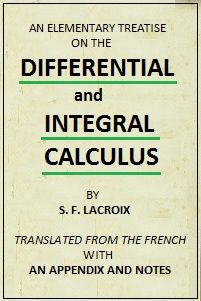An Elementary Treatise on the Differential and Integral calculus by S. F. Lacroix, Charles Babbage

Book Contents :-
Part-I DIFFERENTIAL CALCULUS
1. On Successive Differentiations
2. On the Differentiation of Transcendental Functions
3. On the Differentiation of Equations of Two Variables
4. On the Investigation of the Maxima and Minima of Functions
5. On the Values of Differential Coefficients in Certain Circumstances
6. On the Application of the Differential Calculus to the Theory
7. On the Determination of the Nature and Positions of Remarkable Points
8. Example of the Analysis of a Curve
9. On Osculating Curves
10. On Transcendental Curves
11. On the Manner of Changing the Independent Variable or the Form of the Function
12. On the Differentiation of Functions of Two or More Variables
13. On the Maxima and Minima of Functions of Two Variables
14. General Remarks upon the Application of the Differential Calculus
15. On the Separation of the Variables in Differential Equations
16. Investigation of a Factor necessary to render integrable a Differential Equation
17. On Equations of the First Order in which the Differentials are Separable
18. Methods of Resolving Differential Equations of the First Order
19. On the Particular Solutions of Differential Equations of the First Order
20. Resolution of some Geometrical Problems depending upon the Integral Calculus
21. Investigation of a Function of More than One Variable when the Differentials are of Several Variables
22. On the Integration of Partial Differential Equations of the First Order
Part-II INTEGRAL CALCULUS
1. On the Integration of Irrational Functions
2. On the Integration of Binomial Differentials
3. On Integration by Series
4. On the Integration of Logarithmic and Exponential Quantities
5. On the Integration of Circular Functions
6. A General Method of obtaining Approximate Values of Integrals
7. On the Application of the Integral Calculus to the Rectification of Curves
8. On Equations of Total Differentials which do not satisfy the Condition of Exactness
9. On the Maxima and Minima of Indeterminate Integrals
10. On Differences and Series
11. On the Direct Method of Differences when applied to Functions defined Implicitly in terms of the Independent Variable
12. On the Determination of a Function whose Difference is Expressed by a Given Function
13. On the Integration of Equations of Differences
14. On Equations of Mixed Differences
15. On Recurring Series
16. On the Connexion between the Differential Calculus and that of Differences
17. On Interpolations
18. On the Numbers of Bernoulli
19. Application of the Integral Calculus to the Theory of Series
20. Notes
About this book :-
"An Elementary Treatise on the Differential and Integral Calculus" by "S. F. Lacroix" and "Charles Babbage" is a foundational text that shaped the early development of modern mathematics. First written in French and later translated by Babbage, this work bridges classical European mathematical thought with the emerging analytical methods of the 19th century. It offers a structured and logical explanation of calculus concepts that continue to influence mathematical education today.
Lacroix’s original treatise focuses on the core principles of "differential calculus", presenting clear rules, formulas, and examples to help readers grasp the nature of change and rate. Babbage’s translation adds precision and accessibility, ensuring English-speaking scholars could engage with Lacroix’s systematic approach. Together, they created a work that emphasizes both theoretical depth and practical application.
Covering both "integral calculus" and its relationship to differentiation, this book stands as a cornerstone in the history of mathematical analysis. It reflects the intellectual collaboration between two brilliant minds whose contributions extended beyond calculus to the evolution of scientific thought. Ideal for students, historians, and mathematics enthusiasts, this classic remains a key reference for understanding the "foundations of calculus" and its lasting legacy.
Book Detail :-
Title:
An Elementary Treatise on the Differential and Integral calculus by S. F. Lacroix, Charles Babbage
Publisher:
Cambridge: Printed by J. Smith for J. Deighton and Sons
Year:
1816
Pages:
748
Type:
PDF
Language:
English
ISBN-10 #:
1145120636
ISBN-13 #:
978-1145120631
License:
Public Domain Work
Amazon:
Amazon
About Author :-
The author
Silvestre Franc¸ois Lacroix
was a renowned "French mathematician" whose clear and structured approach helped shape modern mathematical education. His work on "calculus" emphasized logic, precision, and accessibility, making complex analytical concepts easier to understand. Lacroix’s treatises became essential references for students and scholars across Europe. "Charles Babbage", an influential "English mathematician" and inventor, is celebrated as the “father of the computer.” He translated and expanded Lacroix’s calculus treatise, introducing these ideas to English readers.
Similar
Integral Calculus
Books